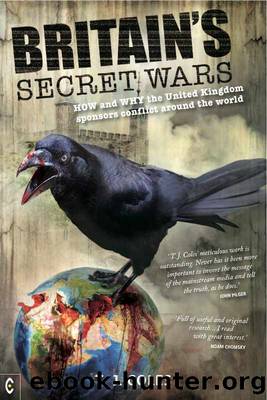Britain's Secret Wars by T. J. Coles

Author:T. J. Coles [Coles, T. J.]
Language: eng
Format: epub
Tags: Education
ISBN: 9781905570690
Publisher: Rudolf Steiner Press
Published: 2016-07-21T14:00:00+00:00
Britain's role deepens
A report backed by the National Union of Journalists, Connect, Unite, Unison and others notes that âthere are no conditions of any sort attached to UK military assistance to Colombia ... This is in direct contrast to US military assistance to Colombia which involves, for a large segment of the aid, regular, and public, human rights reviews and certifications by the US State Departmentâ -which are as worthless as the paper on which they are printed.
The report notes that the British government âsays that some of the assistance provided to the Colombian military is for human rights training. However, HMG has refused to reveal what proportion of UK assistance is for this type of training nor to which units/personnel of the Colombian Army it is providedâ. The report shows that the more âhuman rights trainingâ was provided, the worse the human rights violations become - as is also the case in Bangladesh and Somalia.16
By 1998, FARC controlled 60% of Colombia. The Anglo-American business-military elite devised a strategy to counter FARC's advances. General Peter Pace, Commander in Chief of the Southern Command (the Pentagon agency charged with ruling Latin America), explained that the motive of the Clinton-era Plan Colombia (2000) was âto end the insurgency through negotiated settlement and defeat the illicit drug industryâ. More importantly, it was to achieve âunhindered access to strategic natural resourcesâ.17
A US Congress report explains that Plan Colombia âmade significant progress in re-establishing government control over much of its territoryâ. In 2000, 317,000 Colombians were forced from their homes in a military-paramilitary push against the FARC and other guerrilla groups. This brought the number of internally displaced to 4 million: the biggest internal refugee crisis in the world. A year later, the British Parliament condemned âa United States-led campaign to destroy the peace process between Andres Pastrana's Government and Colombia's guerrilla movementsâ and âfabricate a myth that guerrillas and drugs traffickers are âone dangerous networkâ and legitimise an all-out counter-insurgency warâ.18
Parliament noted that it is the military-sponsored paramilitaries that are responsible for 80% of the drugs trade. Parliament stated: âthe United States in its push for a military solution will waive Plan Colombia's human rights preconditions for military aid to the army for the second time when the Plan is reviewed in February [2001], effectively sanctioning more massacres, displacements, assassinations, torture and disappearances of the unarmed populationâ. Despite these warnings, Britain's support for the Colombian military continued.19
In February 2002, the Colombian military began a massive bombing campaign in the south of the country, followed by an effort to recapture FARC-held territory (Plan Patriota). The oil company-sponsored International Crisis Group conceded that, âAn unusually frank document... concluded the 10 July 2003 London Meeting on International Support for Colombia organised by the British government for some 24 government, international financial institutions, UN and other international organisation delegations, was strongly supportive of the Uribe governmentâ.20
Omitting much of the above, The Guardian reported that Uribe once governed Antioquia and had previously lectured in Latin American studies at St Antony's College, Oxford.
Download
This site does not store any files on its server. We only index and link to content provided by other sites. Please contact the content providers to delete copyright contents if any and email us, we'll remove relevant links or contents immediately.
The Radium Girls by Kate Moore(10969)
The Templars by Dan Jones(4222)
100 Deadly Skills by Clint Emerson(4134)
Rise and Kill First by Ronen Bergman(4068)
The Doomsday Machine by Daniel Ellsberg(3776)
The Rape of Nanking by Iris Chang(3569)
Killing England by Bill O'Reilly(3492)
Hitler in Los Angeles by Steven J. Ross(3480)
Stalin by Stephen Kotkin(3122)
12 Strong by Doug Stanton(3083)
Hitler's Monsters by Eric Kurlander(2770)
Darkest Hour by Anthony McCarten(2681)
Blood and Sand by Alex Von Tunzelmann(2637)
The Art of War Visualized by Jessica Hagy(2447)
Hitler's Flying Saucers: A Guide to German Flying Discs of the Second World War by Stevens Henry(2328)
The Code Book by Simon Singh(2255)
The Second World Wars by Victor Davis Hanson(2153)
Babylon's Ark by Lawrence Anthony(2096)
Tobruk by Peter Fitzsimons(2084)
